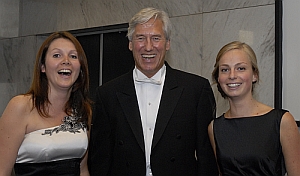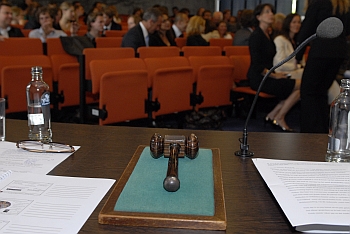Corporate Gatekeepers Captured by Overconfident CEOs
 On June 16, Fred Gertsen has defended his PhD thesis entitled “<link erim events _blank>Riding a Tiger without Being Eaten: How Companies and Analysts Tame Financial Restatements and Influence Corporate Reputation”. In his PhD thesis Fred Gertsen investigates how companies and analysts deal with financial restatements. These corrections of errors of earlier published financial statements caused panic and great declines in stock prices in the financial markets at the beginning of this century, for example during the Ahold and Enron accounting scandals.
On June 16, Fred Gertsen has defended his PhD thesis entitled “<link erim events _blank>Riding a Tiger without Being Eaten: How Companies and Analysts Tame Financial Restatements and Influence Corporate Reputation”. In his PhD thesis Fred Gertsen investigates how companies and analysts deal with financial restatements. These corrections of errors of earlier published financial statements caused panic and great declines in stock prices in the financial markets at the beginning of this century, for example during the Ahold and Enron accounting scandals.
Gertsen studied how analysts were blinded by CEO overconfidence and participated in 'the numbers game'. In extending his findings to other gatekeepers, it appears that CEO overconfidence is contagious and indeed seems to blind gatekeepers collectively. Fred Gertsen comments: “Those who are supposed to dig deepest in financial statements, such as audit committees and independent auditors, publicly report the least. While the opposite is also true: analysts report much more while their probing efforts often are disappointing. There seem to be some systemic weaknesses in the current gatekeeper paradigm, in particular when considering how gatekeepers are ‘captured’ by the CEO. Not a single gatekeeper professional fulfills the role of corporate monitor to the fullest extent possible: probing depth, or disclosing findings publicly, or being captured - always one of these factors seems to limit effective gatekeeper functioning. Those who dig deepest, should be able to tell a full story in an un-biased and ‘capture-free manner!”
His research suggests that pressures to focus on short-term earnings, both by executives and analysts, needs serious reconsideration as it proves to be the culprit in the current company performance reporting paradigm. He finds substantive evidence that in misreporting crisis situations (restatements), the focus of managers and analysts remains on short-term value drivers. Consistent with the recommendations made by the American Chamber of Commerce, Gertsen’s findings would strongly support measures to abandon the expensive ‘circus’ around quarterly earnings guidance.
Fred Gertsen will defend his PhD thesis on Tuesday, June 16, 16.00 hours, at the Rotterdam School of Management, Erasmus University. His promoter is <link people cees-van-riel _blank>Prof.dr. C.B.M. van Riel, Professor of Corporate Communication, Rotterdam School of Management, Erasmus University. Other members of the Doctoral Committee are: Prof.dr. G.M.H. Mertens, Prof.dr. L. G. van der Tas and Prof.dr. J. Kleinnijenhuis. His PhD research project is conducted within the Erasmus Doctoral Programme in Business & Management, organised by ERIM. The Erasmus Research Institute of Management (ERIM) is the joint research institute of the Rotterdam School of Management (RSM) and the Erasmus School of Economics (ESE) at Erasmus University Rotterdam.
 About Fred Gertsen:
About Fred Gertsen:
Fred H.M. Gertsen has been a partner with PricewaterhouseCoopers in The Netherlands for 20 years specializing in assurance services to the Financial Services industry. Currently, he is leading the Dutch Investment Management and Real Estate Industry practice of PwC. He is Registeraccountant at the Dutch institute NIVRA and received a Master’s degree of Professional Accounting from the University of Miami. He has been seconded to London, Singapore and Miami and has worked with a variety of banks, insurance companies, investment managers and large hedge funds.
In the context of his PhD research at Erasmus University Fred Gertsen has published an article in Long Range Planning (August 2006): ‘Avoiding Reputation Damage in Financial Restatements’. He has lectured on topics such as Treasury and Risk management, Banking, Hedge Funds and complex financial instruments.
Abstract:
The primary objective of financial statements is to provide capital market participants with information that enables them to make informed decisions. They also serve to alleviate the so-called ‘agency problem’ – through true and fair disclosures, financial statements contribute to keeping the interest of outsiders (shareholders) aligned with those of the insiders (executives). Material errors, however, will render these financial statements unreliable and can cause great uncertainties to investors and other stakeholders. Subsequent correction of these errors – restatements – often leads to the following question: Can management still be trusted? And subsequently: Where were the gatekeepers?
The avalanche of accounting scandals a few years ago, coupled with the current global credit crises, reiterate that our knowledge of corporate governance failures needs continuous upgrading. This dissertation contributes to understanding why the watchdogs did not bark, and also dissects how common human biases affect the mechanisms of corporate monitoring roles, in particular during restatement crises.
Three connected studies were conducted. A first qualitative study develops a model for gauging restatement severity and provides insight into the forces blurring the 20/20 vision on restatement situations. A second quantitative study is the first study to comprehensively elicit analysts’ perceptions of CEO pressures and behaviours during restatements. A third study corroborates our findings through in-depth interviews with analysts. Combined the studies show that bounded awareness and common human biases heavily influence functioning of executives and gatekeepers in safeguarding corporate reputation during restatements.
More Information
Pictures of the Event
Full Text of the Dissertation


